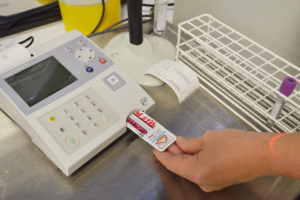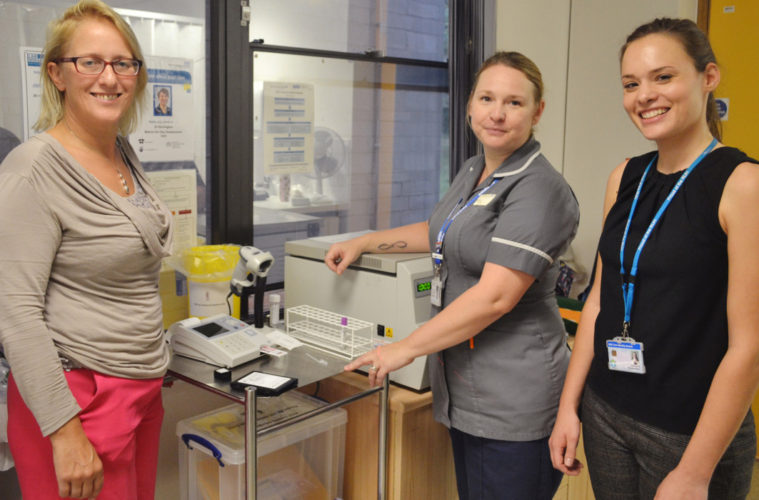Pregnant women can now find out earlier if they are at risk of developing potentially life- threatening pre-eclampsia thanks to a new blood test which is being used at the Royal United Hospitals Bath NHS Foundation Trust.
The Trust is one of the first in the country to use the new test, which measures the levels of a protein made by the placenta, called placental growth factor (PlGF). Studies have shown that women with very low levels of PlGF are more likely to develop severe pre-eclampsia and require treatment, which may include the need to give birth early.
This new test will allow women at risk to be monitored appropriately and improve outcomes for both mothers and babies. The project has been led at the RUH by Research Midwife Mel Rich alongside Point of Testing Coordinator Nicola Hodges.

Mel explained, “This test is a game-changer in how we assess women who are suspected of developing pre-eclampsia. It means we can identify women at risk much more quickly than before and make sure they get the support they need as early as possible.
“The test is quick and easy to do, and our maternity staff can use the new equipment in the department, so the blood sample doesn’t have to go to the lab. So far, we are one of just a handful of hospitals using this equipment, which shows the RUH is once again helping to drive innovation which improves the care of our patients.”
Pre-eclampsia is a condition that affects some pregnant women, usually during the second half of pregnancy (from around 20 weeks) or soon after their baby is born. It is diagnosed through a combination of hypertension (raised blood pressure) and proteinuria in pregnancy (the presence of protein in urine) but as it involves many systems in the body, it can present in many different ways, which can make it difficult to diagnose.
Up to 6% of UK pregnancies will be affected by pre-eclampsia. Most cases are mild and may have no effect on the pregnancy. However, if left untreated, pre-eclampsia can be dangerous for both mother and baby. Pre-eclampsia can potentially progress to a more dangerous condition known as eclampsia, which can cause fits or convulsions. In severe cases, eclampsia can sometimes cause the death of the mother or the baby.
The new blood testing equipment now in use at the RUH is being funded by NHS England for a year, as part of their Innovation Technology Payment initiative. The funding award is the result of the RUH’s involvement in a successful national study, which investigated the clinical use of the new blood test.


